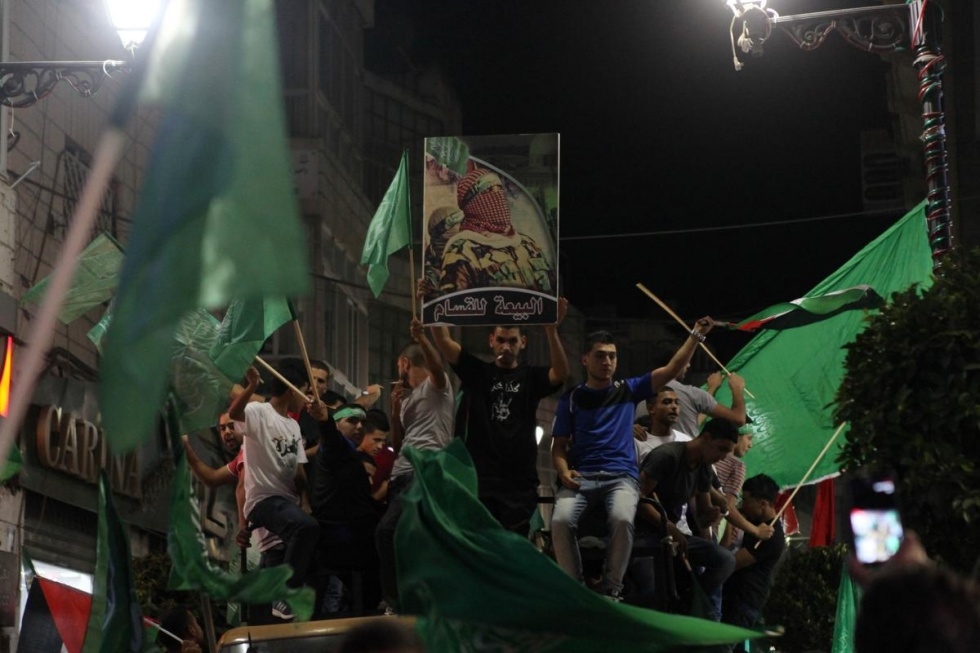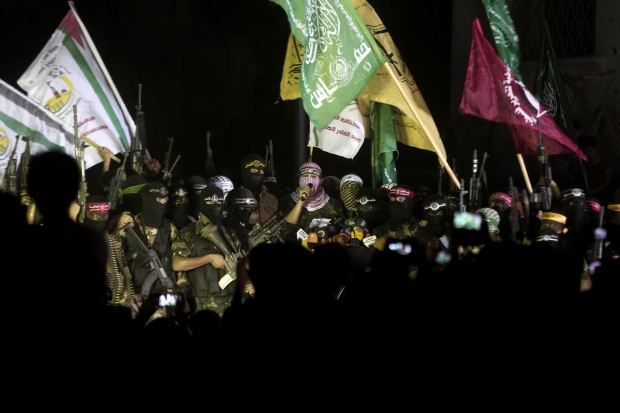West Bank leaders pledge unity, resistance after Gaza

RAMALLAH - Twenty-four hours after a ceasefire over Gaza was agreed upon, Hamas Spokesperson, Abu Ubaydah addressed the crowd with the flags of all other factions – Hamas, Fatah, DFLP – waving behind him. It was a display of unity, a demonstration that after years of fighting the divided political movements were looking to the future as the Palestinian resistance, not warring factions.
Delivered at the mangled landscape of Shejaya – the neighbourhood where some of the past month’s most terrible destruction and bloodshed took place – it was a message, too, that it is a unity built on struggle and sacrifice.
For Palestinians now, Abu Ubaydah told the crowd, resistance erases difference and unites the people. A return to the divisions of the past was disallowed, and the imperative to work together to reform national institutions stressed. The speech, he said, was made on behalf of all Palestinian resistance factions.
“It’s horrible to see so many victims, as we have in Gaza. But to see these people, who are under occupation, stand up in front of this huge power, then this is a victory,” Mahmoud Zawahra, a Popular Committee leader in Bethlehem, said. “The unity among the Palestinian people was very clear and visible yesterday. What this does is bring the culture of resistance, of popular resistance to the front of the Palestinian people’s minds.”
Many in the global community, Zawahra thinks, may wish to see an end to resistance among the younger generations of Palestinians – a “surrender” in the eyes of the Israelis. “But here, now, we are seeing new flowers emerging, a new resistance,” he said.
In the West Bank, events, and the changing public mood, have pushed the leadership to present a plan for action. On Wednesday, senior Fatah official Nabil Shaath told Maan News that the PLO had developed a diplomatic strategy for the months following the ceasefire. This will comprise an application to the UN Security Council to demand a “timetable” for Israeli withdrawal from the occupied Palestinian territories. If the request is denied, he said, the PLO will turn to the International Criminal Court to hold Israeli officials to account for the destruction and death in Gaza.
The PLO executive committee, Fatah Central Committee and other PLO organisations such as the Popular Front and the Democratic Front have all signed the Rome Statute which will allow Palestine to join the ICC as a full member. Only Palestinian President Mahmoud Abbas has yet to sign the document, something that Hamas has put pressure on him to do even though the militant movement could be subject to prosecution as a result.
Shaath also told Maan that Hamas will be a “full partner” in a permanent unity government working to rebuild the Gaza Strip, where nearly 450,000 Palestinians are estimated to be homeless and more than 10,200 have been injured.
Khalida Jarrar, a leader in the Popular Front for the Liberation of Palestine leader and member of the Palestinian Legislative Council, believes this ICC application comes too late; the demand for it, she says, is from the Palestinian people and should be made immediately.
In the past week, Jarrar has been waging a campaign against an apparent crackdown on the PFLP – one that has seen multiple arrests of leaders and an attempt to expel her from Ramallah to Jericho.
“We are sending the message with our feet that we do not accept military orders for us as Palestinians.” Jarrar declared. “Resistance is more powerful when it’s popular resistance, with a strong leadership, Now, we can see that things like the boycott campaign are becoming very important.”
In the coming months, Jarrar believes an alternative political approach should be demanded: one that uses creative alternatives to the current negotiations and mediators – such as holding an international conference to hold Israel to account.
“There is a strong message for unity now, and strong energy,” she said. “The negotiations are united, too. This is a liberation movement, and we need each other. But we also need a clear program. Much of what happens now is up to Fatah and Hamas.”
Mustafa Barghouti, a PLC member of the Palestinian Legislative Council and General Secretary of Palestinian National Initiative, “Mubadra,” stressed that the destruction in Gaza would be repeated if Israel is not restrained. “In my opinion, the only way to do this is to immediately take Israel to the International Criminal Court, and those responsible – the leaders – must be held to account,” he explained.
“The destruction in Gaza is extreme. As you know, we have over 2,000 people killed, and 10,000 injured," he said." Besides that we have 20,000 houses that have been damaged or destroyed, either completely or partially. The infrastructure for water, the sewage pipes, the electricity is also in many cases totally destroyed. These are the human impacts of the war that must be dealt with, and there’s no way we can deal with this except opening free passage to Gaza. It’s essential that there is a free port, with no control on the Israeli side. If there is Israeli control of the passage of goods, the problems will be even further complicated.”
Future progress, Barghouti believes, depends on the ability of the Palestinian Authority and the PLO to take clear action – a process that he says should be coordinated through a meeting of the interim leadership of the PLO, followed by free and fair elections. “The Palestinian authority should be open to all the groups that are representative of the Palestinian people. In elections, every party will get what they deserve,” Barghouti explained. “The groups will be judged depending on their loyalty to the Palestinian cause – and it is crucial that these elections should be without outside interference.”
The forward-looking approach of the leadership appears to undermine Israeli claims to have dealt a serious blow to Hamas, and left Israeli Prime Minister Benjamin Netanyahu’s post-ceasefire address looking shaky. “There is a major military achievement here, as well as a major diplomatic achievement for the State of Israel,” he said in a speech Wednesday evening. The Prime Minister also reiterated the claim that the war had left Hamas “isolated diplomatically” and “instilled in the international community the fact that Hamas, ISIS [Islamic State] and al-Qaeda and other extremist Islamic terrorist organisations are members of the same family”.
From Bethlehem, Mahmoud Zawahra, the Popular Committee leader, said that while armed resistance and Hamas are now enjoying greater support, the escalation and ceasefire have primarily boosted the enthusiasm and optimism for resistance strategies more generally – including the non-violent commitment of Popular Committees.
“Something has been given to the Palestinians in a way. We can go to the negotiations, and we can go feeling stronger. The armed wings have now intervened in political life. And the message they are giving us is that ‘we aren’t going to surrender anymore.’”
“Hamas wants a long ceasefire. This will not contradict with Fatah’s strategy of ending the conflict. Now the focus is going to be on internal processes and rebuilding the systems of the state,” he said. “In the negotiations we saw that the delegation was unified and independent – and we can see from this that future negotiations must be stronger. Hamas is closer to the political game than before, and I think they will not object to the negotiations with the PLO as before.”
In the immediate aftermath of the ceasefire agreement, there’s energy and enthusiasm for unity. But for the Palestinian leadership, whether the momentum will translate to long term progress is still a difficult question.
New MEE newsletter: Jerusalem Dispatch
Sign up to get the latest insights and analysis on Israel-Palestine, alongside Turkey Unpacked and other MEE newsletters
Middle East Eye delivers independent and unrivalled coverage and analysis of the Middle East, North Africa and beyond. To learn more about republishing this content and the associated fees, please fill out this form. More about MEE can be found here.




